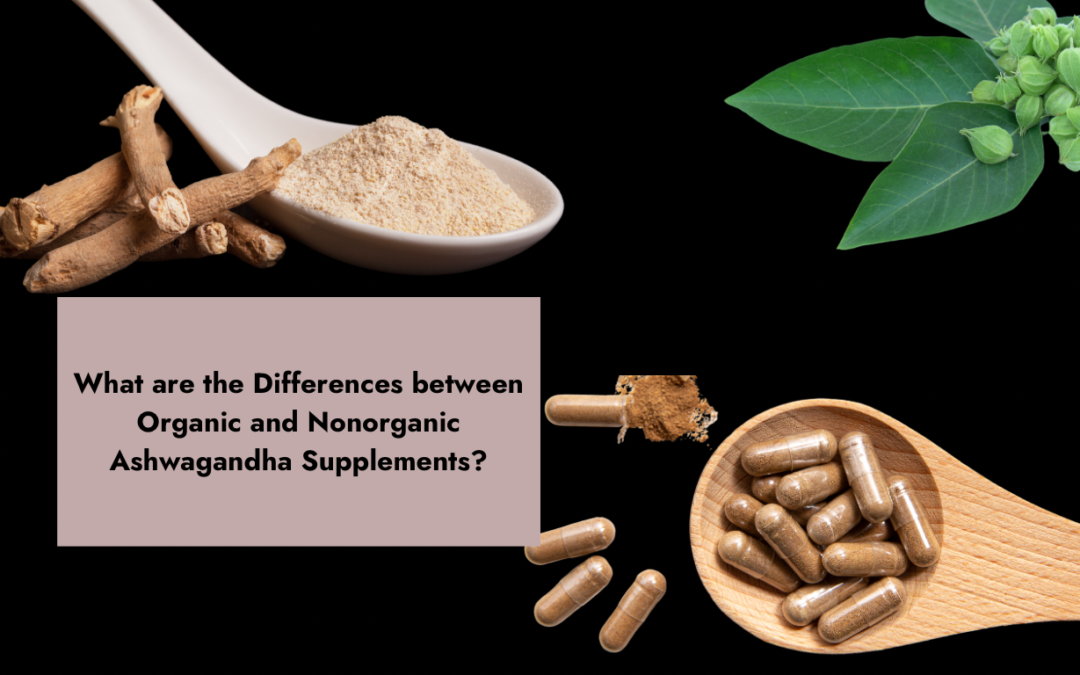Ashwagandha, also known as Withania somnifera, is one of the most popular adaptogens in traditional medicine, especially in Ayurvedic practices.
Known for its ability to reduce stress, enhance energy, support cognitive function, and improve overall well-being, Ashwagandha has made its way into a variety of supplements, from capsules to powders.
However, a key distinction you might come across when shopping for Ashwagandha supplements is whether they are labeled as “organic” or “non-organic.”
While both types of supplements can offer benefits, the differences between organic and non-organic Ashwagandha primarily lie in their cultivation practices, potential exposure to chemicals, and overall environmental impact.
In this blog, we’ll break down what sets these two categories apart and help you make an informed decision when choosing your next Ashwagandha supplement.
1. Cultivation Methods

Organic Ashwagandha:
Organic Ashwagandha is grown without the use of synthetic fertilizers, pesticides, herbicides, or genetically modified organisms (GMOs). Farmers who cultivate organic Ashwagandha follow strict guidelines set by certifying organizations (like USDA Organic or EU Organic).
These methods focus on natural farming techniques such as crop rotation, companion planting, and organic composting to maintain soil health and promote sustainable farming practices.
- No Chemical Pesticides: Organic Ashwagandha is grown without synthetic chemicals, which reduces the risk of pesticide residues being present in the final product.
- Soil Health: Organic farming practices emphasize maintaining soil health and fertility, which can contribute to higher-quality plants and a more sustainable ecosystem.
Non-Organic Ashwagandha:
Non-organic Ashwagandha, on the other hand, may be grown with the use of synthetic fertilizers, pesticides, herbicides, and other chemicals. While non-organic farming can often yield larger quantities of plants at a faster rate, it may come at the expense of environmental health and soil degradation.
- Chemical Exposure: Non-organic Ashwagandha may contain traces of chemicals used in the farming process, including pesticides that are often used to prevent pests from damaging crops.
- Higher Yield: Farmers can use synthetic fertilizers to boost crop yields, potentially resulting in larger quantities of Ashwagandha, but with a greater environmental impact.
2. Purity and Contaminants

One of the most significant differences between organic and non-organic Ashwagandha is the potential for contamination.
Organic Ashwagandha:
Organic certification ensures that the product is grown in a controlled, chemical-free environment, which can lead to a cleaner, purer product. There is less risk of exposure to harmful pesticides, heavy metals, and other pollutants that may contaminate the soil or plant during cultivation.
- Minimal Contaminants: Due to the lack of synthetic chemicals used in the growing process, organic Ashwagandha is less likely to contain harmful toxins that may end up in the final product.
Non-Organic Ashwagandha:
Because non-organic Ashwagandha may be treated with pesticides or grown in soil that has been contaminated with synthetic chemicals, there’s a higher risk of contaminants making their way into the supplement. These contaminants can include pesticide residues, heavy metals, or even artificial additives used during the processing phase.
- Possible Residue: Non-organic Ashwagandha could contain trace amounts of pesticides, herbicides, or other chemicals used during cultivation, even though these are often within government-mandated safety limits.
3. Environmental Impact

Organic Ashwagandha:
Organic farming is designed to have a minimal environmental footprint. By focusing on sustainability, reducing chemical inputs, and enhancing soil health, organic farming practices are generally considered more environmentally friendly.
- Sustainable Practices: Organic farming methods promote biodiversity, reduce soil erosion, and conserve water. These practices help protect the land and ecosystems for future generations.
Non-Organic Ashwagandha:
Non-organic farming can contribute to soil degradation, water contamination, and the loss of biodiversity due to the extensive use of chemical inputs. Pesticide runoff can harm local ecosystems, and the use of synthetic fertilizers can lead to nutrient imbalances in the soil.
- Higher Environmental Cost: While non-organic farming can increase short-term yield, the long-term environmental impact of these practices is often more damaging compared to organic methods.
4. Nutrient Content

There is ongoing debate over whether organic Ashwagandha supplements are nutritionally superior to their non-organic counterparts.
Some studies suggest that organic plants may have higher levels of certain nutrients, including antioxidants, which can be attributed to the stressors of growing without synthetic chemicals.
However, the difference in nutrient content between organic and non-organic Ashwagandha is not always significant.
Organic Ashwagandha:
Organic plants may contain higher levels of beneficial compounds such as withanolides, the active compounds in Ashwagandha responsible for its health benefits.
However, the higher nutrient content isn’t guaranteed, and it may vary depending on factors like soil quality and climate.
Non-Organic Ashwagandha:
Non-organic Ashwagandha can still provide the same active ingredients, particularly withanolides, but there may be slight differences in potency depending on farming practices.
Some people argue that the use of synthetic fertilizers and pesticides might reduce the overall quality of the plant’s nutrients, though scientific evidence on this is limited.
5. Cost

One of the practical considerations when choosing between organic and non-organic Ashwagandha supplements is cost.
Organic Ashwagandha:
Organic products typically come at a higher price due to the more labor-intensive farming practices, certification costs, and lower yields compared to non-organic farming methods.
Consumers who choose organic Ashwagandha are often willing to pay a premium for the peace of mind that comes with knowing their product was cultivated sustainably and without chemicals.
Non-Organic Ashwagandha:
Non-organic Ashwagandha is usually more affordable since it can be produced on a larger scale with fewer restrictions on farming practices. This makes it a more budget-friendly option for consumers who are less concerned with certification or environmental impact.
6. Effectiveness and Safety

Both organic and non-organic Ashwagandha can be effective, provided they are sourced from reputable manufacturers. The effectiveness of the supplement depends on factors like dosage, quality control, and the concentration of withanolides, rather than the farming method. However, organic Ashwagandha may offer additional peace of mind regarding potential exposure to harmful chemicals, which can be important for sensitive individuals.
Organic Ashwagandha:
Typically considered safer due to the absence of synthetic chemicals.
May be preferred by individuals with sensitive systems or those looking to avoid potential chemical exposure.
Non-Organic Ashwagandha:
Generally safe for most people when sourced from reputable brands.
Risk of chemical residue, though levels are typically regulated and monitored by safety agencies.
Conclusion: Which One Should You Choose?
The decision between organic and non-organic Ashwagandha supplements ultimately comes down to your personal values and priorities:
- If environmental sustainability, purity, and chemical-free cultivation are important to you, then organic Ashwagandha may be the better choice.
- If you are looking for a more affordable option and are not overly concerned about the potential presence of chemical residues, then non-organic Ashwagandha can still offer similar health benefits at a lower cost.
Regardless of which type you choose, always ensure you’re purchasing from a reputable brand that conducts third-party testing to guarantee product quality and potency.
Whether organic or non-organic, Ashwagandha is a powerful herb with significant potential to improve your health and well-being. The key is to choose the option that best aligns with your values and health goals.

